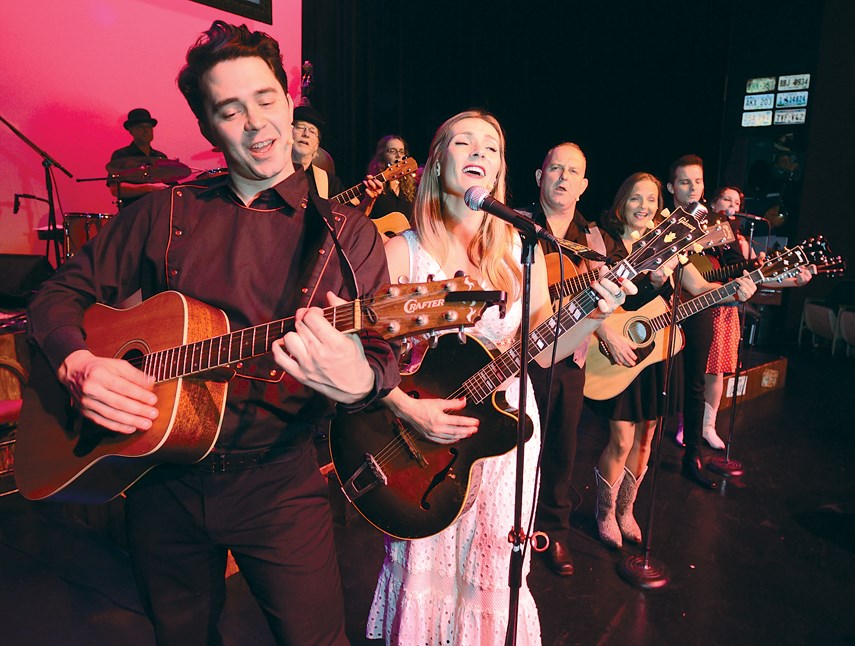Ring of Fire, the Music of Johnny Cash, Deep Cove Shaw Theatre, until Dec. 1, Wednesdays through Saturdays at 8 p.m., except Saturday, Nov. 17 at 2 p.m. only. For more information visit firstimpressionstheatre.com.
In the spring of 2006, Ring of Fire opened in New York.
The show would be a chance for Broadway to give its regards to country music icon Johnny Cash.
It was savaged.
Suggesting the show might be, “the biggest bad idea in town,” New York Magazine critic Jeremy McCarter lambasted the jukebox musical for transplanting Cash’s “dark, resonant songs . . . to a bright Broadway stage.”
Despite hits like “Walk the Line” “Folsom Prison Blues” and “Hurt,” Ring of Fire closed at the Ethel Barrymore Theatre in less than two months.
It wasn’t really a show for the New York theatre crowd, notes First Impression Theatre director Claude Giroux, who remembers seeing Ring of Fire’s rocky debut.
“The expectation on Broadway is for a chandelier to come down from the ceiling,” Giroux explains.
The expansive space of a Broadway stage fell over Johnny Cash’s music like a circus tent. After all, this was a songwriter whose best tales of sinners and wounded souls always felt claustrophobic. With guitar, bass, drums and that Tennessee rumble of a voice Cash’s music conjured up back roads, prison cells, and flawed men grappling with the bad thing they’d done.
No, Broadway wasn’t going to cut it. A much better place, Giroux realized, was Ed’s basement.
When Giroux was working on First Impressions Theatre’s respective tributes to Loretta Lynn and Patsy Cline, the cast would often head over to bass player Ed Fabian’s house and jam in his music room.
Wouldn’t it be something, Giroux thought, if Ring of Fire was just “inviting everybody down into Ed’s living room.”
To give it the feel of a strum and hum type session they’ve yanked the front row seats out of the Deep Cove Shaw Theatre and dragged in chairs and tables. They even got a licence to allow theatre-goers to bring their drinks in and out of the theatre.
Along with 350 images and videos projected during the show, the goal is to make the evening, “decidedly more intimate,” Giroux says.
“The thing I like the most about it is that there’s nobody up there trying to be Johnny Cash, trying to copy Johnny Cash,” he notes. “It’s not what I call an idol show.”
Instead, 11 musicians and performers are slated to celebrate – not recreate – Cash’s music. There’s fiddle and piano, six-part harmonies and a 1952 Gibson guitar.
Many of the performers are on cordless instruments, leaving to the possibility of roaming the stage. It seems an appropriate way to honour a musician who’s been everywhere, man.
And while Ring of Fire is rooted in country, the show stretches to rock ‘n’ roll, bluegrass, hillbilly and spiritual music.
The variety of musical styles is appropriate when we consider Cash as an interpreter of Shel Silverstein (the children’s author who penned “Boy Named Sue”) and Nine Inch Nails (the industrial rock act that originally performed “Hurt”).
Part of the appeal of Cash is the way he seemed to belong to many worlds without renouncing citizenship in any of them. He’s in the Country Music Hall of Fame, the Rock ‘n’ Roll Hall of Fame, and if there was a psychobilly hall of fame he’d be in that, too, having coined the term on his 1976 long-term auto theft tune, “One Piece at a Time.”
Cash was an outlaw. Cash was a Christian. Friend and collaborator Kris Kristofferson famously described Cash as, “a walking contradiction, partly truth and partly fiction.”
The show doesn’t attempt to explain the apparent contradictions, only to treasure the music those contradictions produced.
“He was an everyman who wrote songs about everybody,” Giroux says.
Giroux likens Cash to Leonard Cohen in that he wrote lyrics “that got to the heart of people’s experiences.”
Ring of Fire also includes an original painting by Russell Thomas featuring a pensive Cash smoking a cigarette while black clouds rest on his brow. The piece will be up for grabs in a silent auction during the run of the show.
Ring of Fire might have started its life as a big, bad idea, but as Cash notes in his autobiography, his family motto going back to Scotland is: “Better Times Will Come.”
With a bit of luck, better times might be here for Ring of Fire.



